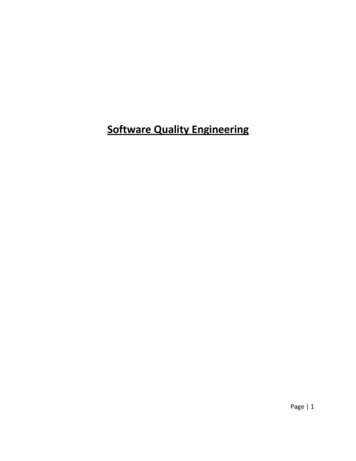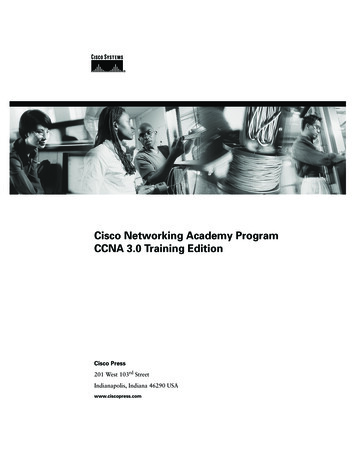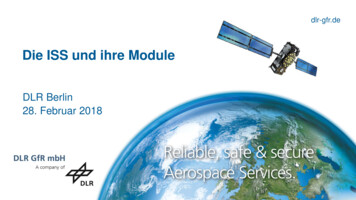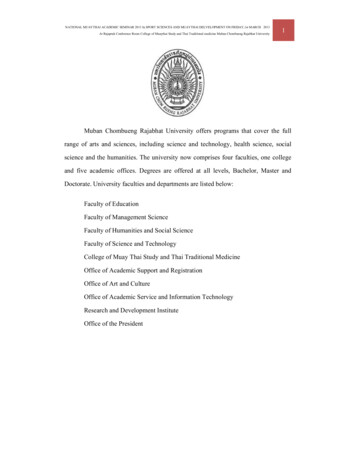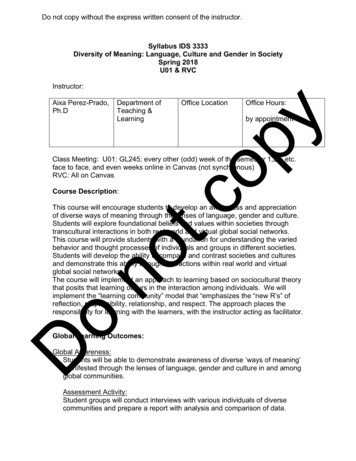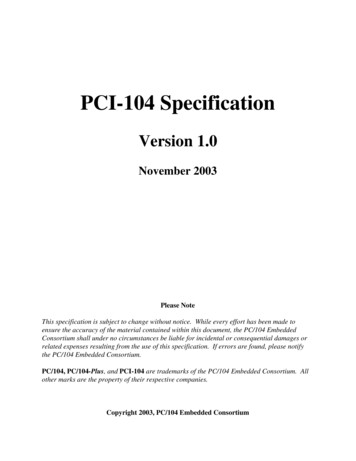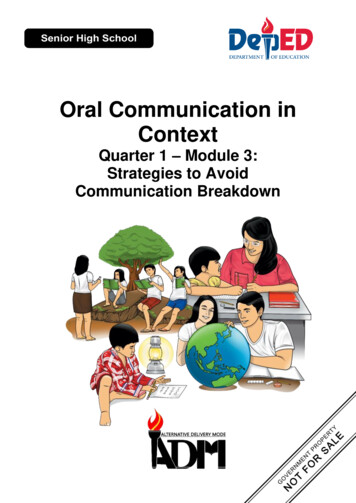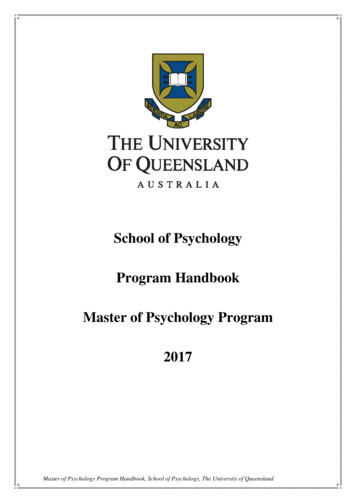
Transcription
Module HandbookMaster Study ProgramBusiness Intelligence and Data AnalyticsUniversity of Applied Sciences Emden/LeerFaculty TechnologyDivision Mechanical EngineeringMaster Degree Program(Version: 2021)
Table of Content1. Overview . 3Introduction . 4Module structure Business Intelligence and Data Analytics . 5General Definitions . 6Abbreviations. 72.Mandatory Modules . 82.1 Introduction to Data Sciences (Summer semester). 92.2 Communication & Culture (Summer semester) . 102.3 Computer Sciences (Winter semester) . 112.4 Machine Learning (Winter semester) . 122.5 Data Management (Summer semester) . 132.6 Controlling (Winter semester) . 142.7 Business Analytics (Summer semester) . 152.8 Project T / Project B (Winter and Summer semester, alternating) . 162.9 Master Thesis and Colloquium . 173. Elective Modules . 183.1 Marketing (Summer semester). 193.2 ERP- Systems (Winter semester) . 203.3 Digitalization and Automation (According to demand, Summer semester) . 213.4 Simulation of Production Systems (Winter semester) . 223.5 Data Security (According to demand in Winter-, Summer semester) . 233.6 Quality Management (Winter semester) . 243.7 Advanced Project Management (According to demand in Winter-, Summer semester) . 253.8 Current Topic (Winter-, Summer semester) . 262
1. OverviewFacultyTechnologyDivisionMechanical EngineeringDegreeMaster of Engineering (M.Eng.)Standard period of study3 SemesterTotal Workload90 ECTS3
IntroductionBusiness Intelligence and Data Analytics is an advanced Master's program, which is primarily aimed at Bachelor'sgraduates from the fields of engineering or natural sciences. Prospective students must have at least one year of fulltime work experience as a prerequisite for admission. The goal of the Master's program is for graduates to acquireprofessional and interdisciplinary qualifications.Students learn statistical and computational methods for the acquisition, management and analysis of large andcomplex data sets as well as the extraction of knowledge and information from these data sets. The program alsoincludes courses on data security, data confidentiality and data ethics. Taking into account the requirements andchanges in the professional world, the program is designed to provide students with the necessary specializedscientific knowledge and methods in such a way that it enables them to reflect scientifically, apply scientificknowledge and methods and act responsibly in the relevant professional fields.Graduates of the Master's program have excellent career opportunities in industry and business as well as in scienceand research.With regard to the required knowledge of the students, the Business Intelligence and Data Analytics Master programpursues several goals. The students are able to achieve additional qualifications in the following areas:- Technical skills- Professionalization; expansion of social and personal competencies- Business skills; as well as an introduction to the basics of business administration, law and various aspects ofmanagementThe introductory modules in the Business Administration/Management column (Business Modules) are conducted atMaster's level. Students in the program have at least one year of work experience after completing their Bachelor'sdegree. In addition to social and professional skills, the students' personal skills are also important, which give theprofile of the Business Intelligence and Data Analytics program the master's level.In lectures and seminars, students are able to apply and reflect on the acquired skills and knowledge directly topractical professional situations, problems and questions. Students gain practical experience in teams (project work)as well as independently and learn to work on tasks in the areas of management, law and business administrationand to solve problems under qualified guidance. The students' previous knowledge of the professional environmentand the additional insights they gain into economic, administrative, legal and social contexts of the professional fieldcan be integrated into the course of studies and promote personal and professional development.The international profile of the students is closely related to the modules of the master's program BusinessIntelligence and Data Analytics. The students' previous knowledge enables them to grasp the contents of themaster's program and thus to follow the learning objectives.4
Module structure Business Intelligence and Data AnalyticsModules Master Business Intelligence and Data AnalyticsIntroduction to Scientific Working2 ECTSTechnical Mandatory ModulesTechnical Compulsory ElectiveModulesSimulation ofProduction Systems**Introduction toData Science*5 ECTSProfessionalization Compulsory ElectiveModulesCurrent Topic T**Quality Management**Business Analytics*Project B*5 ECTS5 ECTS1 . / 2. Semester3./4. Semester5 ECTSCommunication &Culture*5 ECTS2./ 1. Semester4. / 3. SemesterData Management*1 . / 2. Semester3./4. Semester5 ECTS5 ECTS2./ 1. Semester4. / 3. SemesterControlling*15 ECTS5 ECTSBusiness Mandatory Modules15 ECTS5 ECTSProfessionalization Mandatory ModulesProjectT*25 / 20 ECTSMachineLearning*25 / 20 ECTSComputerSciences*Business Compulsory Elective ModulesERP-Systems**Current Topic B**5 ECTS5 ECTSMarketing**Current Topic B**5 ECTS5 ECTS5 ECTS5 ECTSDigitalization andAutomation**Current Topic T**5 ECTS5 ECTS5 ECTSAdvanced Project Management**5 ECTSData Security **5 ECTSLegend: * Mandatory Module total 45 CP (ECTS)occupancy of modules **Compulsory Elective Module total 15 CP (ECTS); Optional selection ofTechnical ModulesProfessionalization ModulesComputer SciencesMachine LearningData ManagementProject TCurrent Topic TDigitalization andAutomationSimulation of ProductionSystemsData Security Introduction to Data ScienceCommunication & CultureAdvanced Project ManagementQuality Management3/.5Semester28 ECTS30 ECTSMaster Thesis and ColloquiumBusiness Modules Business AnalyticsControllingProject BCurrent Topic BMarketingERP- Systems5
General DefinitionsEvery module of Business Intelligence and Data Analytics follows the principles below: English is the obligatory language of all modules and courses. One module has a time span of one semester and a successfully completed semester is rewarded with 30ECTS. Every successfully completed module rewards students with 5 ECTS. The program has a modular structure, comprising mandatory and elective modules. These modules enablean interdisciplinary study in the fields of key qualifications, economics and technology. Generally, the order of modules is arbitrary and some of the elective courses are upon necessity. Forparticular courses the requirements of the module handbook are applicable. Thus, students are able toattend the offered courses each semester. By taking elective modules, individual specialization and deepening is possible. The scope of the mandatorymodules is 45 credit points (ECTS). The modules from the compulsory elective area amount to 15 creditpoints (ECTS). In addition, there is the Master's thesis with colloquium amounting to 28 credit points (ECTS)in addition with the compulsory lecture Introduction to Scientific Working with 2 credit points (ECTS)amounting to a total of 30 credit points (ECTS). One credit point corresponds to 30 hours of work for thestudent. Courses not being part of the general curriculum of the study program Business Intelligence and DataAnalytics are available upon request. A participation above 60% leads to a selection of the course as anelective module. The modules from the first and second semesters do not build on each other in terms of content, so that it ispossible to start studying in the summer or winter semester. In the summer semester the modules of thefirst semester are offered, in the winter semester the modules of the second semester. Students who begintheir studies in the summer semester first hear the courses from the first semester. In the followingsemester, they hear the courses from the second semester. For students who begin their studies in thewinter semester, the order is reversed.6
AbbreviationsAbbreviations and forms of examination(DV)Creation and documentation of computer programs(K) (#) written exam (processing time in time hours)(M)oral examination(P)project report(H)term paper(S)student research project(PA)Examinations of other kind(SWS) Semester hours per weekAccording to the General Part of the Master Examination Regulations (Part A)7
2. Mandatory Modules8
2.1 Introduction to Data Sciences (Summer semester)Lecturer in charge:Form:Type:Contact-Time (h):Self-Study-Time (h):Exam:ECTS:Prof. Dr. Elmar WingsLectures, exercises, case studiesMandatory module6090Term paper (H)5CompetencesData Science is an interdisciplinary subject that brings together the fields of computer science, mathematics and therespective application area. After this course, students understand how all three areas are equally considered.Students know the essential components of data analysis, also of Big Data analysis, and their tasks. They are familiarwith the basic functions of the components. Students know the general structure of the components and canillustrate and apply the basic algorithms and methods. They are not only familiar with libraries, frameworks, modulesand toolkits, but can also use and implement them in a concrete way. Thus, they develop a deeper understanding ofthe interrelationships and learn how essential tools and algorithms of data analysis work in the core.ContentThe basics of Linear Algebra, Statistics and Probability Theory are developed and applied in Data Science. Theproperties of data sets are introduced so that the students also have a deeper understanding of Big Data. Thestudents are not only able to consider ethical issues in collection and use, but also know the basics of the Basic DataProtection Regulation DSGVO). Furthermore, various algorithms from the field of Data Science are introduced withtheir areas of application. Models, e.g. k-nearest Neighbors, Naive Bayes, linear and logistic regression, decisiontrees, neural networks and clustering are shown. Different methods of supervised, unsupervised and reinforcementlearning will be discussed. The course includes an introduction to Python 3 and its ecosystem.Literature Howard Anton, Chris Rorres, Anton Kaul: Elementary Linear Algebra, Applications Version, Wiley, 2019Chesterton, Scott: Machine Learning: This Book Includes Machine Learning for Beginners, ArtificialIntelligence and Machine Learning for Business, Networking for Beginners, Independently Published, 2019Grus, Joel: Data Science from Scratch: First Principles with Python, 2016, O'ReillyDatenschutz-Grundverordnung (DSGVO)Härdle, Wolfgang Karl, Lu, Henry Horng-Shing, Shen, Xiaotong: Handbook of Big Data Analytics, Springer,2018CourseLecturerProf. Dr. Elmar WingsPrerequisite for participation:Applicability of the module:TitleIntroduction to Data SciencesSPPW4MII, MTM9
2.2 Communication & Culture (Summer semester)Lecturer in charge:Form:Type:Contact-Time (h):Self-Study-Time (h):Exam:ECTS:Prof. Maria Krüger-BasenerLecture and Seminar in combinationMandatory module6090Oral exam (M)5CompetencesStudents know theories on cultures and intercultural communication and understand the historical genesis ofcommunication differences. The students perceive cultural differences in communication for concrete situations andcan reflect, adapt and optimize their own personal behaviour.Students are capable to cope with cultural diversity in given communication settings with focus on business relatedsituations. The students can draw on sufficient experience and knowledge due to their cultural background, workexperience and previously completed bachelor's degree, thus the course is taught at master's level.Content Cultural Information: Germany in Comparison to selected students‘ countries of origin: Values and norms inbusiness and in everyday lifeBasics of interpersonal communicationDevelopment of international communication in the course of timeModels and theories on international communication, also within international enterprisesCommunication in international teamsInternational communication systems and virtual team workLiterature Glover, Jerry; Friedman, Harris L. (2015): Transcultural competence. Navigating cultural differences in the globalcommunity. First EditionHall, Edward T.; Hall, Mildred Reed (1990): Understanding cultural differences. Yarmouth, Me.: InterculturalPress.Hofstede, Geert H.; Hofstede, Gert Jan; Minkov, Michael (2010): Cultures and organizations. Software of themind: intercultural cooperation and its importance for survival. 3rd ed. New York: McGraw-Hill.Jandt, Fred Edmund (2013): An introduction to intercultural communication. Identities in a global community.7th ed. Thousand Oaks, Calif.: Sage Publications.Moran, Robert T.; Abramson, Neil R.; Moran, Sarah V. (2014): Managing cultural differences. 9. ed. London, NewYork: Routledge.Samovar, Larry A.; Porter, Richard E.; McDaniel, Edwin R. (Hg.) (2014): Intercultural communication. A reader.14th edition. Wadsworth.St. Amant, Kirk; Kelsey, Sigrid (2012): Computer-mediated communication across cultures. Internationalinteractions in online environments. Hershey, PA: Information Science Reference.CourseLecturerProf. Maria Krüger-BasenerTitleCommunication and CulturePrerequisite for participation:Applicability of the module:MBM, MMB, MII, MTMSPPW410
2.3 Computer Sciences (Winter semester)Lecturer in charge:Form:Type:Contact-Time (h):Self-Study-Time (h):Exam:ECTS:Prof. Dr. Rüdiger GöttingSeminar form lecture, exercisesMandatory module6090Creation and documentation of a Computer Program (DV)5CompetencesBy completing this course, students are able to implement complex project using standard libraries.Moreover, the students understand standard paradigms in creating GUIs and implementing multi-threadapplications. They comprehend object oriented paradigms and make use of standard methods in object orientedsoftware-systems. The students are able to develop an application using an ide.ContentThe course contents might be summarized by four topics: Advanced concepts of a higher language Frameworks design patterns software development using an ideLiterature J. T. Streib, T. Soma: Guide to Java; Springer Verlag, 2014Lars Vogel: Eclipse IDE: Eclipse IDE based on Eclipse 4.2 and 4.3. vogella series.; 2013Lecture notesCourseLecturerProf. Dr. Rüdiger GöttingTitleComputer SciencesPrerequisite for participation:Applicability of the module:MII, MTMSPPW411
2.4 Machine Learning (Winter semester)Lecturer in charge:Form:Type:Contact-Time (h):Self-Study-Time (h):Exam:ECTS:Prof. Dr. Elmar WingsLectures and exercisesMandatory module45-6090 - 105Term paper (H)5CompetencesMachine learning refers to methods and tools that enable computers to make decisions without being explicitlyprogrammed. In the last decade, the field of machine learning has made great progress, especially in areas such asnatural language processing and computer vision. This course covers basic (e.g. linear models, tree-based models)and advanced (e.g. deep neural networks) methods of supervised machine learning and their application in variousbusiness contexts.Students know and understand important basic principles and methods of symbolic Artificial Intelligence, especiallyknowledge representation, planning and inference. They are able to analyze procedures, approaches, ethical andtechnical risks, and limitations of intelligent systems and are able to develop and evaluate solutions for typical AIproblems. Students are able to develop applications for Classifications and prognosis models using machine learningmethods and to use them within their area of competence.They can work on smaller problems both independently and in teams. They present their work in lectures and haveto justify their choice of methods.ContentIn this module the following topics are covered: basic concepts: knowledge discovery in databases process, machine learning, exploratory data analysis,preparation of data sets, validation models, generalization linear and generalized regression models, logistic regression classic machine learning models: Bayesklassifikatoren, next-neighbour methods, decision trees, randomforest trees, support vector machines model evaluation and selection neural networks, deep learning, convolutional neural networks for image processing tasks long short term memory for automatic language recognition and translationLiterature Katharina Zweig: Ein Algorithmus hat kein Taktgefühl, Heyne, 2019Hannah Fry: Hello World, dtv, 2019Josh Patterson, Adam Gibson: Deep Learning: A Practitioner's Approach. O’Reilly, 2017Jörg Frochte: Maschinelles Lernen Grundlagen und Algorithmen in Python. Hanser Verlag, 2019Joshi, Ameet V, Machine Learning and Artificial Intelligence. Springer (2020)Datenschutz-Grundverordnung (DSGVO)CourseLecturerProf. Dr. Elmar WingsPrerequisite for participation:Applicability of the module:TitleMachine LearningSPPW4MMB, MII12
2.5 Data Management (Summer semester)Lecturer in charge:Form:Type:Contact-Time (h):Self-Study-Time (h):Exam:ECTS:Dr. Tirazheh Zare GarizyLectures, exercises, case studiesMandatory module6090Term paper (H)5CompetencesTo become a data driven company, it is essential to understand data management and develop an ecosystem, whichmeets data management requirements. The course will enable students to understand the principles of datamanagement, and its use cases. It covers not only the technical and architectural aspects of the data collection andprocessing, but also the strategic aspects. Students can use the tools, methods, and guidelines to develop a holisticdata management solution. They will also be able to deep dive in specific themes of data management and elaboratethem in the relevant application area. Moreover, with case studies and exercises during the course, students will beable to gain hands-on experience during the course.ContentThe lecture includes the principles of data warehousing, fundamentals of data storage in data lake the cloud, and itsassociated ecosystem. It will furthermore focus on the topics like data strategy, data architecture, metadatamanagement, data quality, and data governance.Literature Strengholt, Piethein: Data Management at Scale: Best Practices for Enterprise Architecture, 2020, O'ReillyLinstedt, Daniel: Building a Scalable Data Warehouse with Data Vault 2.0, 2015, Morgan KaufmannDAMA-DMBOK: Data Management Body of Knowledge: 2nd Edition, 2017, DAMA InternationalCourseLecturerDr. Tirazheh Zare GarizyTitleData ManagementPrerequisite for participation:Applicability of the module:MMB, MTM, MIISPPW413
2.6 Controlling (Winter semester)Lecturer in charge:Form:Type:Contact-Time (h):Self-Study-Time (h):Exam:ECTS:Prof. Dr. Carsten WilkenSeminar form lecture, exercisesMandatory module6090Written exam (K2)5CompetencesAfter having visited this lecture, students will be able to fulfill the main accounting-related tasks of Engineers intechnical organizations, such as planning and control. Among others, they will be able to: Plan capital investments and evaluate investments proposalsSubmit yearly budgets for your area of responsibility and interpret reports about itIn case of plan-to-actual deviations, analyze any reasons for this deviationCost products and interpret product-costings.In addition to this, the students will know how different costing-systems will affect key ratios of work and how thatinfluences decision control. Thus, they will be able to use systems and values of internal accounting for decisionmaking and decision control, and they will be able to evaluate existing procedures of companies.Content Fundamentals of AccountingAccounting for decision making and controlkey figures of the accounting systemValues and reports of AccountingPlanning of Capital InvestmentsBudgetingProduct CostingCost AllocationSystems of Cost Accounting (Absorption Costing, Variable Costing, Standard Costing)Variance AnalysisLiterature Horngren, C.; Datar, S.; Foster, G.; Rajan, M.; Ittner, C.: /Foster: Cost Accounting – A Managerial ApproachZimmerman, J.: Accounting for Decision Making and Control; McGraw HillCourseLecturerProf. Dr. Carsten WilkenTitleControllingPrerequisite for participation:Applicability of the module:MBM, MMC, MTMSPPW414
2.7 Business Analytics (Summer semester)Lecturer in charge:Form:Type:Contact-Time (h):Self-Study-Time (h):Exam:ECTS:Prof. Dr.-Ing. Anne SchweizerSeminaristic lessons, Serious gaming, TeamworkMandatory module6090Project report (P)5CompetencesStudents gain the understanding and competence of how available internal and external company data can beanalyzed in such a way that concrete entrepreneurial problems can be considered in an evidence-based manner andthen solved. Business analytics is considered applied data science in business administration. Process-relatedquestions, organizational internal interrelationships, etc. can be analyzed with the help of this discipline. Thestudents learn four central phases "framing", "allocating", "analytics" and "preparation" and the respective methodsto be able to process the phases. In their own case study, the students apply the theoretical knowledge and areguided to train intensively how they can also deal with ethical challenges of the discipline in the corporate context.Content 4 BA phases (according to Seiter) "Framing", "Allocating", "Analytics", "Preparation", incl. associatedmethodsProject and team management (e.g. agility, communication)Visualization of resultsStorytelling of resultsLinking data analytics with the mission, vision, strategy and goals of companiesDealing with Big Data (VVVV)The increased use of analytical models for the automated control of entire operational processesTransferring decisions from people to systems: (1) Purely digital processes, (2) Semi physically digitizedprocesses, (3) Fully digitally controlled physical processes.Challenge by aspects of Disruption / within the Professional Field of Data ScienticstCritical discussion and reflection - opportunities, limits, data and privacy protection (DSGVO & differences toselected national jurisdictions)Literature Seiter, Mischa: Business Analytics. Wie Sie Daten für die Steuerung von Unternehmen nutzen (2019)Weber, Felix: Künstliche Intelligenz für Business Analytics. Algorithmen, Plattformen undAnwendungsszenarien (2020)Martini, Mario: Blackbox Algorithmus – Grundfragen einer Regulierung Künstlicher Intelligenz (2019)Oppl, Stefan; Stary, Christian: Designing Digital WorkConcepts and Methods for . Dr.-Ing. Anne SchweizerTitleBusiness AnalyticsPrerequisite for participation:Applicability of the module:MBMSPPW415
2.8 Project T / Project B (Winter and Summer semester, alternating)Lecturer in charge:Form:Type:Contact-Time (h):Self-Study-Time (h):Exam:ECTS:Degree program’s coordinatorSolving of a problem independently under the guidance of a supervisor,presentation and discussion of the results preparation of a project reportMandatory module30120Project report (P)5CompetencesStudents are able to independently solve a comprehensive problem in the field of technology or economy in ascientifically sound manner using the knowledge and techniques acquired.ContentThe topic/problem can be proposed by the examinee but has to be approved by the examiner/supervisor.Literature Question from the field of technology or economyLiteratureProject dependent literatureCourseLecturerUniversity lecturer of the study courseTitleProject T / Project BSPPW416
2.9 Master Thesis and ColloquiumLecturer in charge:Form:Type:Contact-Time (h):Self-Study-Time (h):Exam:ECTS:Prof. Dr. Elmar WingsTo a large extent independent development of a problem and supervision.Mandatory module90810Scientific report, Master thesis and Colloquium30CompetencesThe students are able to work on a given problem. They are able to explore the current scientific literatureindependently and draw conclusions.In doing so, they apply their acquired knowledge and develop goal-oriented solutions within the framework of theirMaster's thesis. They have in-depth knowledge in the field of project management and can apply this knowledgeadequately in scientific projects.ContentCurrent topics within the field of Business Intelligence and Data Analytics including technical deepening or one of the deepening within the department of technical engineeringIndependent acquisition of a subject with the help of technical literature and other sourcesLayout of verbal presentations and written scientific papers with the potential for scientific publication.Literature Guide to Writing a Seminar Paper; Göx, RobertSpecial literature concerning the topicCourseLecturerProf. Dr. Kathrin OttinkLecturer of the study courseTitleIntroduction to Scientific WorkingMaster Thesis and ColloquiumSPPW217
3. Elective Modules18
3.1 Marketing (Summer semester)Lecturer in charge:Form:Type:Contact-Time (h):Self-Study-Time (h):Exam:ECTS:Prof. Dr. Henning HummelsLecture, exercise classElective module6090Written exam (K1)5CompetencesThe students have a critical understanding of the most important theories, principles and methods of modernmarketing and are able to identify, assess and solve issues with relevance to Marketing in unknown and complexcontexts. To this end, they know how to use basic marketing tools such as the Ansoff matrix or the BCG productportfolio model. The underlying knowledge reflects the state-of-the-art in literature and research, and delves intoselected fields of expertise. The students are able to critically discuss Marketing issues and to expand theirknowledge base independently.ContentThe course is designed to be taught jointly in the Technical Management and Business Intelligence and DataAnalytics programs, whose students usually have a technical and scientific bachelor's degree. For this reason, inaddition to the teaching of general concepts, there is a consistent focus on business customer and industrial goodsmarkets. The course will be held in English.At the beginning, the role of marketing within a company is clarified as well as the importance of focusing allcompany activities on customers. Subsequently, purchasing behavior in the B2B (Business-to-Business) sector isexplicitly considered. Principles and methods of market research are also discussed, with particular reference tomodern methods of data collection and analysis. The basics of strategic marketing planning are conveyed as theguiding principles of the company’s activities. This leads to a detailed examination of the elements of the marketingmix”, i. e. the product, price, distribution and communication policy, each with selected special features for dealingwith industrial markets. Product policy is based on the concept of the product life cycle and also deals withinnovation and product modification processes as well as the management of brands and product ranges. Pricingpolicy focuses on cost-, demand-, and competition-oriented pricing methods as well as price management over time.In communication policy, the entire set of classical and modern communication instruments is considered, while indistribution policy all alternatives of direct and indirect distribution channels are dealt with. The concept of thecustomer journey integrates both.All contents are being illustrated by using up-to-date examples from both consumer and industrial goods markets.Exercises and short case studies allow for an application of learned contents to real life scenarios. At the end of thesemester, a use-case supported introduction to a CRM system takes place in order to let the students experiencestructures and possibilities of such standard software in the company.Literature Jobber, David: Principles and Practice of Ma
Students know theories on cultures and intercultural communication and understand the historical genesis of communication differences. The students perceive cultural differences in communication

